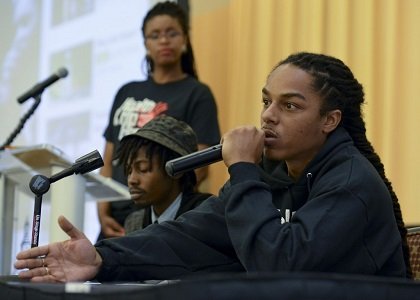(NNPA) — In an effort to increase awareness about HIV/AIDS among young Black men, a group disproportionately impacted by the epidemic, health-care providers and community stakeholders hosted the “Health and Hip Hop Conference” in October at Morgan State University in Baltimore.
Students from Maryland’s four historically Black colleges and universities—the University of Maryland Eastern Shore, Bowie State University, Coppin State University and Morgan State University—participated in the event, which included a spoken-word competition; breakout sessions on hip-hop, sexual health and HIV/AIDS prevention; and performances by local hip-hop artists. Roughly 150 students attended, according to conference organizers, and more than 50 people were tested for HIV and other sexually transmitted diseases.
The daylong program was sponsored by the Black AIDS Institute, the Maryland Department of Mental Health and Hygiene, and the Morgan State University School of Community Health and Policy’s Get SMART (Students/Society Mobilized and Retooled to Transform) Project.
Grim Jackson, an 18-year-old freshman communications major at Morgan State, said that he can relate to people who suffer from stigma associated with AIDS; when he was younger, students made fun of his mental disability.
Although reluctant to discuss the challenge it presented, Jackson said that the taunts and ridicule changed to cheers when he started performing. “I was in high school and I just started writing, and people were like, ‘Oh, my God, you’re good,’” said Jackson, who won second place in the spoken-word competition.
Get SMART Project Director Lorece Edwards, DrPH, the director of community practice and outreach in the department of behavioral health sciences at Morgan State’s School of Community Health and Policy, said that health-care providers and HIV/AIDS advocates and researchers wanted to educate young minority men about sexual-health choices and their possible outcomes. “This is a platform, a safe and brave space for men, that allows them to talk about health and hip-hop and their life experiences,” she said.
Justin Wooley, a consultant with the Black AIDS Institute, agreed. “We need HIV prevention messages with an ‘attitude,’ in the same way we had Niggaz Wit Attitudes, N.W.A,” said Wooley, referring to the hip-hop group. “The same way we talk about Magic Johnson, we have to talk about Eazy-E,” the N.W.A member who died of AIDS in 1995, nearly four years after Johnson announced his retirement from the NBA after testing positive for HIV.
Although the story of Eazy-E’s death was covered in magazines like Newsweek, Vibe and Jet, reports of heterosexual transmission were rare, and therefore, the possibility that Eazy-E had acquired HIV heterosexually was easily dismissed in favor of rumors of closeted homosexual activity, illicit-drug use, murder by HIV injection, tainted acupuncture needles and other urban legends.
During the panel titled “Hip-Hop, Health and Healing,” students and featured guests discussed masculinity, the perception that hip-hop perpetuates misogyny and homophobia and more.
Messiah Ramkissoon, an MC, youth advocate and three-time winner of Showtime at the Apollo for his spoken-word performances, said that homophobia is a sensitive subject in hip-hop and that people with perspectives on both sides need to be more tolerant. “People live their lives the way they choose, and they should not be disrespected or counted out from the culture because of it, but those that are homosexual also have to understand that certain people don’t agree with homosexuality,” Ramkissoon said. “The conversation is so sensitive that when you say you have a different perspective, well, now you’re homophobic.”
He continued: “We have to understand how to nation-build, acting civilized whether you’re gay or you’re straight. We have to be able to have differences and still love each other as family. These conversations have to happen without hate getting involved.”
Kenton Dunson, a hip-hop artist on a panel about ways the music has affected health outcomes among Black men, suggested that artists be more creative and less afraid to use their art to raise awareness about health disparities affecting Black communities. “J. Cole is probably a step away from doing that,” Dunson said. “He can say it and do it and be fine because he’s an established artist, but for someone like me who is still trying to get their numbers up and create awareness around my music, it might set a trend or it might not.”
Dr. Edwards explained that health disparities persist because health-care providers fail to include marginalized communities in the discourse about prevention strategies and the development of best practices that are necessary to address those disparities. “We need to give a voice to the people that we want to reach,” she said. “They can tell researchers and academics and community-based organizations what best works for them. They’re the experts. We’re not the experts.”
Dr. Edwards continued: “If we can create spaces where men can be themselves and feel safe in sharing what’s in their hearts and minds and their experiences, then we can all heal.”
